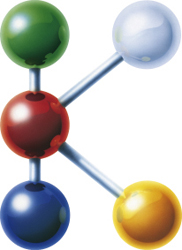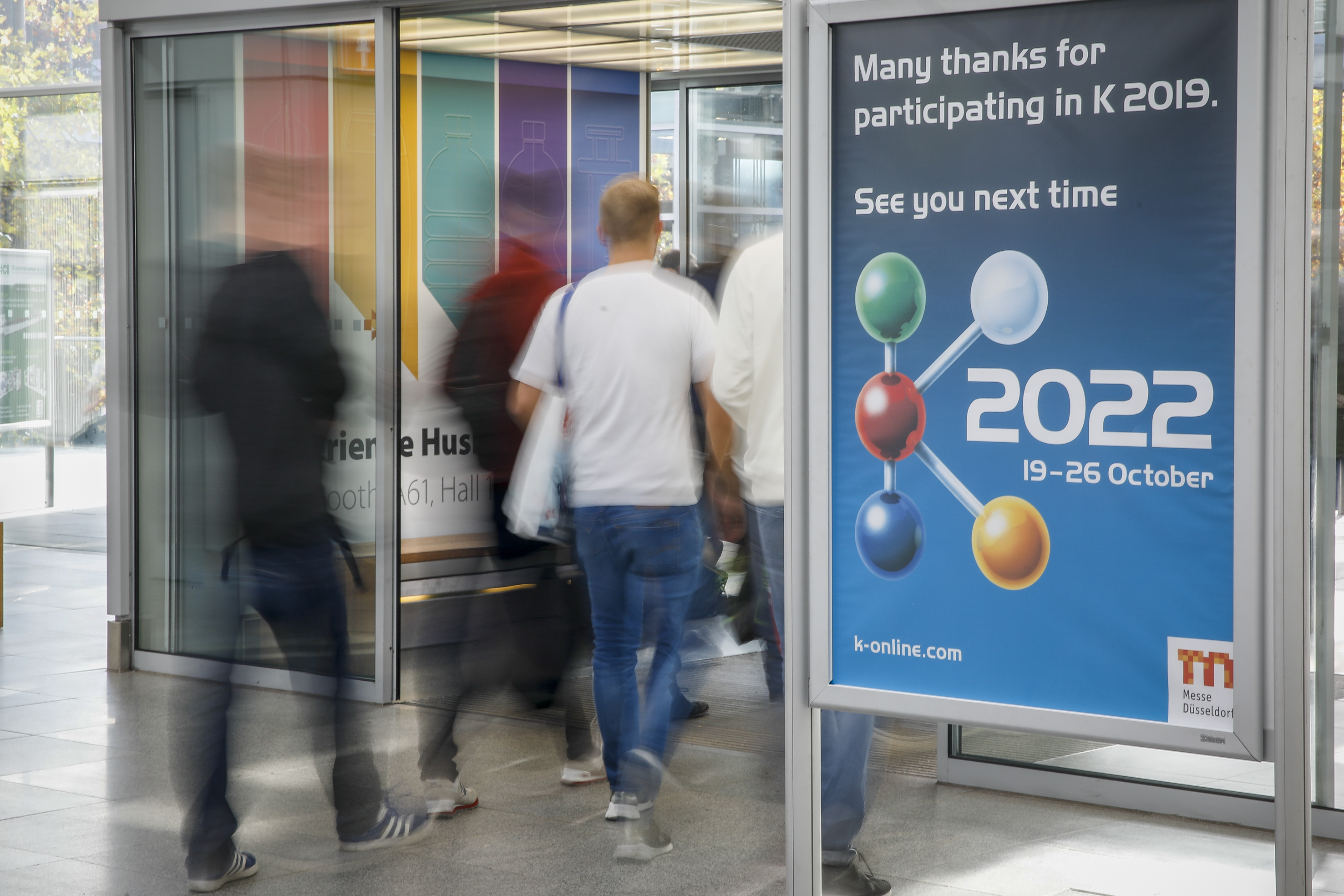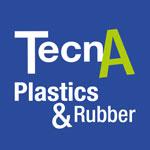 Strong Impetus for Industry: High Propensity to Invest among the 224,116 Trade Visitors from 168 Countries
Strong Impetus for Industry: High Propensity to Invest among the 224,116 Trade Visitors from 168 Countries
Circular Economy is “Hottest Ticket” for the Global Plastics and Rubber Industries
K, the leading global trade fair for the plastics and rubber industry, has drawn to a close in Düsseldorf after eight days on Wednesday (23 October 2019). The 3,330 exhibitors from 63 nations proved impressively: plastics continue to be an innovative, indispensable material. But they also unanimously underscored the necessity of having operational circular economies along the complete material chain and to this end already presented numerous concrete solutions. Companies struck a nerve with people with this focus because the approximately 224,116 visitors from 168 countries took great interest especially in recycling systems, sustainable raw materials, resource-saving processes. Furthermore, K 2019 was characterised by a high propensity to invest as before. The intention among the international trade audience to get perfectly geared up for the future with the latest technologies was clearly perceivable.

“K 2019 came at precisely the right point in time. Its enormous importance for the sector is underpinned by its high acceptance levels all over the world. There is no other place the industry is represented so internationally and completely as here in Düsseldorf every three years,” says Werner Matthias Dornscheidt, President & CEO of Messe Düsseldorf, and explains: “Especially in turbulent times platforms such as K are indispensable. It provides guidance and perspectives, is an economic driver, shows forward-looking trends and concrete approaches. The industry and its professional associations enjoyed the unique opportunity here to present sector-specific solutions and debate questions of socio-political relevance on a global scale. And they have capitalised on this opportunity outstandingly well.”
Ulrich Reifenhäuser, Chairman of the Exhibitor Advisory Board at K 2019, was absolutely delighted at K 2019 results: “The plastics and rubber industry succeeded in proving once again that plastics are not only very valuable materials with outstanding properties but also that this industry assumes responsibility along the entire value chain. The buzzwords at K 2019 “Reflect. Re-Think. Think Laterally. Think Afresh.” were mirrored 1:1 by exhibitors’ stands. Never before has the industry addressed an issue so unanimously and worked on solutions so consistently as is the case now in the fields of environmental compatibility, saving resources and avoiding waste. There is a spirit of new departures prevailing in the industry and current dynamics are overwhelming.”
And the positive mood prevailing at K 2019 was also echoed by concrete demand at exhibition stands: “It became clear that global demand for innovative machinery and raw materials is particularly high right now, despite the current tensions in world trade or the business climate in some consumer sectors. This year’s K has by far exceeded our expectations and was able to generate key impetus for sustainable governance and new business models,” said Reifenhäuser.
The nations especially well represented on the part of visitors after Germany were Italy, the Netherlands, India, Turkey and China, followed by the USA. Furthermore, a marked increase in the number of trade visitors from the Russian Federation, Japan and Brazil could be registered. The number of executives among K visitors rose slightly yet again: to the tune of 68% came from top or middle management. While for German trade visitors increased efficiency ranked first as today’s most important issue, for European and non-European trade fair guests the expansion of product and service portfolios was in the foreground.
Results from the visitor survey confirmed a view held by exhibitors – namely that the international origin of visitors had increased yet again: It stood at 73.1% as compared with 70.8 % in 2016. Over 42% of all foreign visitors came from overseas – travelling to the Rhine from Angola, Burkina-Faso, the Bahamas, the Cayman Islands, the Dominican Republic, Honduras, Madagascar, Mauritania, Mongolia, Myanmar, French Polynesia or Tajikistan. As expected, the experts from Asia accounted for the biggest group of foreign visitors: to the tune of 40,000 experts came from South, East and Central Asia. India was represented with the highest number of visitors, while visitor attendance from China and Japan was up again considerably.
Almost 20,000 visitors travelled to K 2019 from North and South America, which corresponds to a 7% increase. Compared to 2016, there was an especially marked increase in the number of guests from Brazil.
In terms of guests from the neighbouring European countries Italy dominated with over 10,000 visitors, followed by the Netherlands (approx. 9,000), Turkey (over 7,500) France (over 6,700), Belgium (over 6,300), Spain (over 5,100) and Russia (some 5,000).
The proportion of executives among trade visitors registered was at an extraordinarily high level across all national borders. Two-thirds came from top and middle management.
For visitors within their companies there are currently four targets in focus: product range expansion, increased efficiency, circular economy, i.e. the sustainability of their products and the sustainability of their production. To the tune of 60% of visitors rated the current economic climate as “very good” and “good”, nearly as many expect the situation to be similar over the next two months.
Machinery and equipment manufacturing, the biggest segment at K 2019 with 1,975 exhibitors, was also centrestage in terms of visitor interest, with two-thirds of all people surveyed mentioning this area first. 52% said they were primarily interested in raw materials and auxiliaries, whereas for 28% of visitors semi-finished products and technical plastics and rubber parts were the major reason for coming (multiple choices possible).
Once again K scored points as the platform for the premieres of many forward-looking products and applications to a global audience. These innovations were not only marvelled at but there were also many concrete negotiations taking place and contracts concluded. “We found the propensity to invest extremely high and across all nations. In particular, business with new customers was very positive this year. We are also very confident about very strong follow-up business,” says Reifenhäuser.
Over half the decision-makers from the industry stated they had come to Düsseldorf with concrete investment intentions. For visitors from throughout the world investment in expansion ranked particularly high on the list, especially in extruders and extrusion lines, injection moulding machines as well as machinery and equipment for reclamation and recycling. The survey polling visitors at K also showed that interest in recycling systems is noticeably higher abroad than in Germany.
Flexible materials – rubbers and thermoplastic elastomers (TPE) – also proved a fixture at K again. Although the elastomer segment has traditionally been smaller than the plastics range at K, there was a high number of exhibitors presenting elastomer-specific products and converting processes – be it raw materials, additives or compounds, special machines and equipment for reclamation and converting.
Visitors came from all key user industries – from packaging, construction and automotive to electrical and medical device technology and agriculture. Overall, they again awarded top marks to the ranges displayed in the 18 exhibition halls: 96% were impressed with the ranges exhibited at K 2019, 95% confirmed they had achieved their aims 100% over the course of their visits.
The extensive supporting programme at K 2019 boasting keynotes and high-calibre discussions such as on renewable energies, material efficiency or zero-waste production met with avid interest among the international audience, especially the Special Show K 2019 “Plastics shape the Future”. This year the innovative power of the material and the industry in terms of resource-saving processes, digitalisation, functionality, renewable energies, circularity and sustainability were centrestage. And such critical themes as marine litter, the throw-away mentality associated with plastic packaging and the use of finite resources for their production were not ignored either. Proving one of the highlights was a humanoid robot that was built during K 2019 by young researchers from FabLab Lübeck e.V. serving as an example to show where developments are headed in future when additive manufacturing and robotics are combined with cutting-edge materials such as plastics.
At the Science Campus both exhibitors and visitors to K 2019 were given a condensed overview of scientific activities and results in the plastics and rubber sector. Numerous universities, institutes and funding agencies provided opportunities for direct dialogue.
The next K Düsseldorf will be held from 19 to 26 October 2022.




